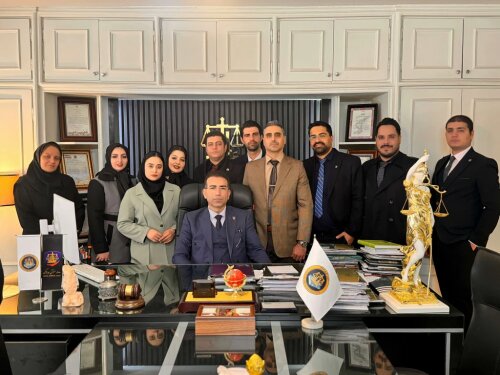Best Child Custody Lawyers in Mashhad
Share your needs with us, get contacted by law firms.
Free. Takes 2 min.
Free Guide to Hiring a Family Lawyer
List of the best lawyers in Mashhad, Iran
About Child Custody Law in Mashhad, Iran
Child custody in Mashhad, Iran, is governed by Sharia law as interpreted under the Iranian Civil Code. The law places the welfare and best interests of the child as a primary consideration, alongside religious, cultural, and social values. Custody arrangements-known locally as "Hizanat"-are typically established after parental separation or divorce. In general, mothers are granted custody of young children until a certain age, after which fathers may claim custodial rights. Local courts in Mashhad play a crucial role in determining the living arrangements, care, and educational needs of children whose parents are separated or divorced.
Why You May Need a Lawyer
Child custody cases can be emotionally charged and legally complex. Here are some common situations where people seek legal help relating to child custody in Mashhad:
- You are facing divorce and want to secure custody or visitation rights for your children.
- You are in disagreement with your former spouse about the care, schooling, or religious upbringing of your child.
- You believe the other parent may be unfit due to issues such as neglect, abuse, or addiction.
- You intend to relocate with your child, and the other parent objects to the move.
- The terms of your current custody agreement are not being honored or require modification.
- You are a grandparent or close relative seeking custody due to the parents’ absence or incapacity.
A lawyer can help you understand your rights, negotiate custody agreements, navigate the legal process, and represent you in Mashhad’s Family Courts.
Local Laws Overview
Child custody laws in Mashhad are based largely on national laws, but local courts may interpret and apply these rules within the context of Mashhad’s social and cultural customs. Core aspects include:
- Custody Age Limits: Generally, mothers have custody of boys until age 7 and girls until age 9, after which custody may shift to the father unless a court decides otherwise for the child’s welfare.
- Best Interests of the Child: Courts consider the child's welfare above all, taking into account factors such as emotional well-being, safety, and upbringing.
- Visitation Rights: The non-custodial parent is typically granted visitation, unless there is evidence that contact would harm the child.
- Modification of Custody: Custody arrangements can be modified by the court upon significant changes in circumstances or if the child’s interests are not being met.
- Guardianship vs Custody: Legal guardianship, often concerning financial and legal decisions, is generally held by the father, while day-to-day physical custody can be with either parent.
- Parent’s Remarriage: A mother’s remarriage can affect her right to custody in some cases, especially if the child’s well-being is deemed at risk.
- Relocation: Relocating a child outside Mashhad, particularly abroad, often requires consent from both parents or a court decision.
- Role of Family Courts: Disputes are resolved in Mashhad’s Family Courts, which have specialized procedures for dealing with custody, visitation, and related disputes.
- Parental Ability: Courts may investigate the living conditions, character, and ability of each parent to care for the child.
Frequently Asked Questions
Who has the right to child custody after divorce in Mashhad?
Initially, mothers are generally granted custody of children (boys up to age 7, girls up to age 9). After these ages, fathers may petition for custody. However, courts can rule otherwise if it serves the child's best interests.
Can a mother lose custody if she remarries?
Yes, under some circumstances. If the mother’s remarriage is believed to endanger the child's welfare or is opposed by the father, the court may transfer custody to the father or another relative.
What if one parent is deemed unfit?
If a parent cannot provide adequate care because of issues such as addiction, neglect, or abuse, the court may deny or remove custody and grant it to the other parent or a qualified guardian.
Can grandparents or other relatives get custody?
Yes. If both parents are unable or unfit to care for the child, grandparents or other close relatives can apply for custody, subject to court approval.
How is visitation determined?
Visitation rights are given to the non-custodial parent unless contact with the child is deemed potentially harmful. Specific schedules are often set by the court.
What if one parent wants to move to another city or country with the child?
Relocation generally requires the agreement of both parents or a court order. Unauthorized relocation can lead to legal consequences and possible loss of custody.
Can custody arrangements be changed?
Yes. If circumstances significantly change or if the child’s needs are not being met, either parent (or a guardian) may petition the court to review and modify the custody order.
How does the court decide what is in the child’s best interests?
The court assesses the child’s emotional, educational, and physical needs, as well as family environment, parental ability, and any risks to the child’s well-being.
Is the child’s preference considered in custody decisions?
In certain cases, especially as children grow older, the court may take the child’s wishes into account, but the final decision rests with the judge.
What legal documents are needed for a child custody case?
Common documents include marriage certificates, birth certificates, residency documents, evidence of income, school records, and any evidence supporting claims of unfitness or best interests.
Additional Resources
If you need additional information or assistance, consider the following:
- Mashhad Family Courts: The primary judicial body for child custody cases.
- Iranian Organization for the Welfare of Children: Provides support and advocacy for children’s welfare and family issues.
- Legal Aid Centers in Mashhad: Offer consultations for those unable to afford private legal representation.
- Family Counseling Centers: Provide mediation and psychological support during custody disputes.
- Ministry of Justice - Family Affairs Division: Offers information and guidance on marriage, divorce, and child custody procedures.
Next Steps
If you find yourself in a child custody dispute or need guidance during or after a separation, consider the following approach:
- Consult a qualified family law attorney familiar with Mashhad’s legal system to understand your rights and obligations.
- Prepare all relevant documentation, including marriage and birth certificates, any court orders, and records evidencing the child’s best interests.
- Explore mediation or counseling services to resolve disputes amicably, whenever possible.
- If necessary, file a petition in the Mashhad Family Court for custody, modification, or enforcement of custody orders.
- Seek guidance from local legal aid organizations if you cannot afford private representation.
Acting proactively with the right legal help can help protect your rights and the well-being of your child throughout the custody process in Mashhad, Iran.
Lawzana helps you find the best lawyers and law firms in Mashhad through a curated and pre-screened list of qualified legal professionals. Our platform offers rankings and detailed profiles of attorneys and law firms, allowing you to compare based on practice areas, including Child Custody, experience, and client feedback.
Each profile includes a description of the firm's areas of practice, client reviews, team members and partners, year of establishment, spoken languages, office locations, contact information, social media presence, and any published articles or resources. Most firms on our platform speak English and are experienced in both local and international legal matters.
Get a quote from top-rated law firms in Mashhad, Iran — quickly, securely, and without unnecessary hassle.
Disclaimer:
The information provided on this page is for general informational purposes only and does not constitute legal advice. While we strive to ensure the accuracy and relevance of the content, legal information may change over time, and interpretations of the law can vary. You should always consult with a qualified legal professional for advice specific to your situation.
We disclaim all liability for actions taken or not taken based on the content of this page. If you believe any information is incorrect or outdated, please contact us, and we will review and update it where appropriate.










